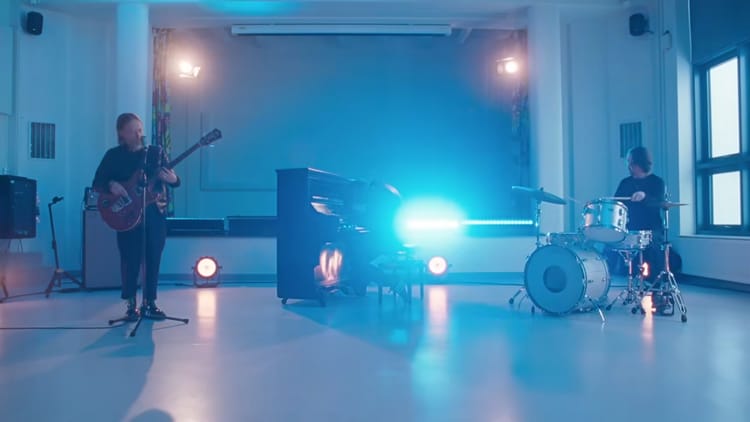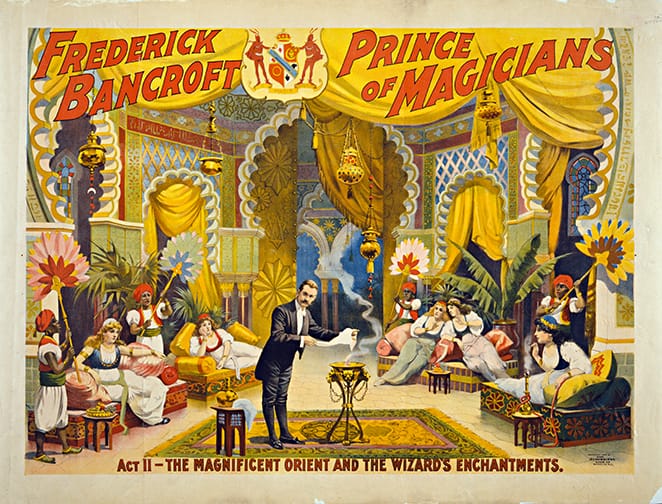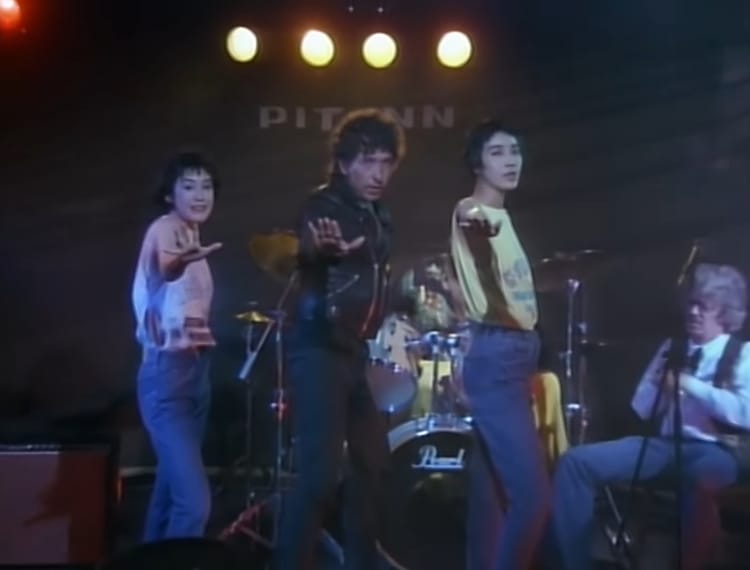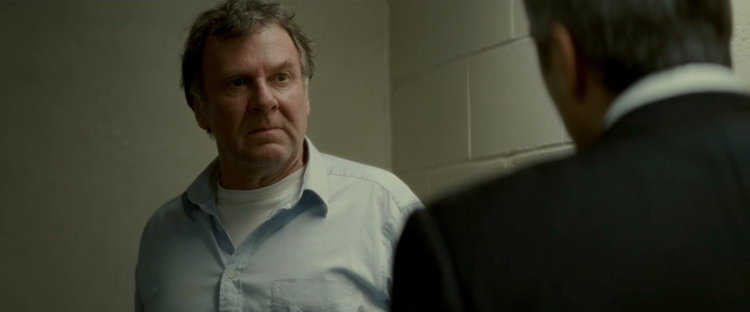This Is My Fascination, Vol. 3 - Part One
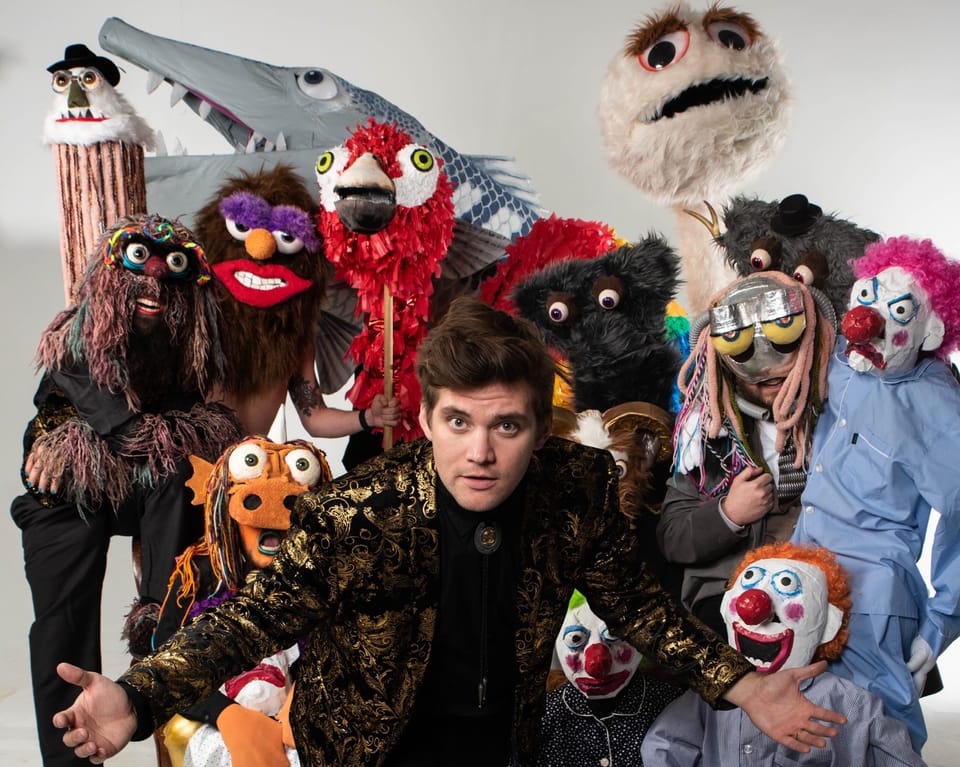
There’s something sort of wonderful about this column, at least for me personally. When I invited the great Frank Falisi (editor at Bright Wall/Dark Room and writer-about-town) to submit a fascination, he offered a few topics we both love, but then asked me, “Does the name Nick Lutsko mean anything to you?” I admitted that it did not, and so Frank informed me, “I think he's a genius. He saved my life a few times with stupidity.” I decided this was exactly what I wanted from this exercise: immersion into something unfamiliar.
Nick Lutsko remained unfamiliar to me until the night before I was scheduled to speak with Frank, at which point I hit Google, and abruptly became consumed by my own deep fascination with an entertainer I can only describe as unclassifiable. Lutsko’s medium is music, and that music is often very funny, but to call him a comedian would be to ignore several wings—including more sincere songwriting, innovative costume work, and a dense web of weird narrative—in the trans-media canon Frank describes as “the Nick Lutsko project.”
For about 16 hours, I submerged myself in something considered brilliant by someone I consider brilliant. It was a privilege, and this conversation was wonderful. Then things took an even more wonderful turn. Because, of course, this is only Part One of This Is My Fascination, Vol. 3. But we’ll get there.
Note: This conversation has been edited for length and clarity.
How do we do this? What a topic! A topic I have only been aware of for 24 hours, maybe 12, and I'm already deeply enamored of.
I've never shared this topic with anyone–and I've shared it with many people–and not had them be at least partially enamored. But usually overwhelmingly curious about, But what is going on?
I would say a little overwhelmed even just to look at the YouTube page and say, Where do I start with all this?
Yeah, I couldn't imagine starting now.
I think Laura Jane Grace of Against Me! reposted “I Wanna Be at the RNC” on Twitter, in, like, season one of COVID. It was just that video without any context. I had no idea who this human was. I had no idea what was going on in my own world. And I remember watching it in the parking lot of the now-shuttered AMC Hamilton with my friend Ray, who I live with, and we were just watching it on the phone. And that's ground zero for whatever this fascination became. So I couldn't imagine now having to intentionally leap into, like, Let me try and study this human being.
I can tell you how I did it, but I want to talk about the RNC thing for a second. That one is fascinating–it reminded me so much of Conner O'Malley's stuff. You know him?
Very much so, yeah.
It reminded me of that sort of hyperbolic, screamy conservatism that I've never necessarily seen in the wild, but seems to get at the collective unconscious spirit of the guy who wants to go to the RNC.
Yeah, and that character, I think, is really integral to what is so overwhelming, and overwhelmingly fascinating, about the Nick Lutsko project, and what is funny about it, and what is occasionally scary about it.
And also, there's so many bad versions of that. Political joke songs have haunted our world, and the internet, in a post Limewire world. And there's a few really strong elements at play that inoculate the comedy, and the songs, from really being overly corroded by that influence.
Have we aged into this from Weird Al? Is there a lineage there? Or is there something transcendent?
Yeah, I thought about that. I think it really helps if you are a childhood-slash-adulthood fan of Weird Al, as I certainly am. It greases the wheels to open your mind up to something like this. I think they're both weird in different ways, though. In different, related ways. I go back, as always, to Mark Fisher's definition of the weird, which is: the weird is that which does not belong. It's this new presence that has appeared in old systems, in systems you expect to run a certain way. And I think he goes on to talk about how montage is the best example of the weird, because you've conjoined these forms. It's like the thing in Carpenter's The Thing. And so with Weird Al, I think that conjoining is our singular and mass memory of a song, or a song style, and the presence of something that is almost like it. And so we're always thinking we hear our memory of it, but we're also having to deal with this new thing. And so in that moment, we feel the weirdness.
But with Nick Lutsko, the matter of the songs is so often systems that run our world, which is to say: politics, the social contract, the media landscape.
Jeff Bezos.
Yeah, Jeff Bezos, Amazon, take your pick. And the fact that it's coming to us so often through social media, or at least songs on the computer,1 but these systems are being followed through to their logical, illogical conclusion with these approaches, and this absurd character. That's that weirdness–it's almost a weirdness of recognition, a lot of the time.
And he doesn't write parody songs–with Weird Al, it's parody or pastiche. And these are not really pastiche of anything. And then there's the very sincere music as well, which is certainly not what Weird Al does. Swords–or S-Words2–is not a comedy album. It’s got a wry bent to it, because it seems like he can’t not. Excellent, excellent music.
I started there. I just thought, OK, Nick Lutsko is a musician, so we'll start with this album. OK, this is really interesting. What’s this other one? Oh, Spirit Halloween? We're in a very different realm already.
And those are the two that I've just been bouncing back and forth between for the last 16 hours: “Sideshow” and “Spirit Halloween.” It’s a beautiful duology of music that says something about who this guy is.
I have to confess, I have not gone as deep, or I don't hold as dear, the less-funny music. I think it's both really useful and probably silly to separate them arbitrarily. But I think we have to, if only because Nick Lutsko’s background, from what I can tell from the internet, is in commercial songwriting. That's one of his other side hustles, is writing commercial jingles,3 which I think colors both strands of the music, right? I think that's why you have this very purposefully jazz-funk, fusion, jam band, Tennessee thing going on, and then in these other [comedy] songs, what is infernal about them is, they're written as commercial jingles. I can show these songs to anybody, and even if they don't go in for humor like this, they're overwhelmed by the catchiness. I think that's what's so interesting about that strand of it. I would love to ask him how much that is at play when composing in the other mode. How do you, as a songwriter, not try to write catchy a certain way? How do you try to orient it in a different sort of sense? There are different muscles, but I don't speak that muscle. So I'm curious.
Now I'm thinking about the Spirit Halloween song. And it is, it's just so catchy. It could be the song for something my kids are seeing while they're watching Paw Patrol. [sardonic] Not that my kids watch Paw Patrol, I would never, ever allow that into my house.
I think that's probably the other thing that set me up with Nick Lutsko: I know how large commercials loomed in my life. Watching television, walking through supermarkets in the ‘90s, which just had a different, in-your-face approach to advertising. We're familiar with that language, but we're still really susceptible to it. So to have it weaponized in these specific ways is extra disarming, and I think that's what makes the reaction, or at least makes my reaction, so much bigger–my joy so much bigger.
And then there is one strong strain to what he does, which is music-ifying conservative text. I think that’s the only awareness I had of him before–there's an Alex Jones as indie folk one. That had crossed my eye.
My path through a lot of his music was following the “songs on the computer” as they were being released. And they were being released, like, weekly. We were in this unknown hellscape holding pattern, and every week, there'd be a new thing. And then going back and seeing those [pre-COVID] ones–those are strange because in their own way, they're kind of doing what the non-comedy music is doing. I find them really sweet, despite the words themselves being usually abject and terrifying. We're taking something evil, and we're making it sound good. In a weird restructuring of the pop instinct, that Alex Jones indie rant is funny, and it's soothing. It's a very strange tension to live in–again, that conjoining.
Yeah, there is a tension there. Because you wouldn't want to be accused of being Jimmy Fallon ruffling Trump's hair.
It always feels pointed enough that it has successfully distanced itself from the text–from the object.
Well, it defamiliarizes the words in order to recontextualize them and make you hear them anew.
But taken alongside the treatment of conservatism in a lot of the other comedy songs, they're also responding to Trump and Trump-era conservatism. It is a sort of meeting it where it stands, as opposed to expecting it to be better, or expecting it to have decorum. It’s trying to go pound for pound with it across the political spectrum.
And there is that sort of absurdist chaos to that presidency. Not that you can put any real brackets on current events, but if you put brackets on those four years, versus whatever comedy music was coming out of the Bush years, you're tapping something very different. And he does effectively–he and someone like Conner O'Malley tap that absurdist horror.
There's the aesthetic similarity to something like Don't Hug Me I'm Scared. Part of the project–the Nick Lutsko project, as you said–is the puppetry element, or the costumes, which is a little scary.
It really is. And the lore, right? The songs have these lore elements that are just funny if you're not thinking about it–the men in the tunnels. Where Grandma is in all of this. Big pizza. Gremlins 3.
But even that is another - I don't know what that is like. It's not satirizing building a world, and sci-fi stuff. But it's unhomely in its own way.
Unheimlich?4
Yeah. You're building a world, partially, and you're implying the world's existence. And we don't know anything else about the men in the tunnels. We know that this person thinks there are men in the tunnels, and seems to have proof.
And there's people in the woods in Tennessee. You see that?
I don't think I did, no.
It's fall in Tennessee, and the air smells like pecan pie, and that's when the people in the woods are coming out–you'll hear it. It's lovely.
Oh, there's so many of them. And it's lovely to not feel completest about them. Despite the lore, I can tune out for a couple months, and then forget, and then pop back in, like, Oh, OK, a song about crickets.
It's very disturbing, that one. I couldn’t finish that video. It upset me.
As with all of our interests, I'm always surprised when other people aren't picking up the beats on stuff like this. I think this is an interesting limb of what the moving image is doing right now, and should be treated as such.
So what is this, as a limb of what the moving image is doing?
I think there's a couple different ways to get into that. But one, if we take the language of these comedy songs to be a language of capital, language of commercialism, these are commercials sort of popping into our feed. And there's something about their appearance on social media, social media as lore, as this setting of stories and like, stories you can't always access–literally stories, right? Instagram?
Oh, sure, yeah, Instagram Stories.
And the fact that we are invited on a daily basis to scroll past these monstrous absurdisms. But it seems like they can only land when they're catchy, when they're able to get through your armor of the blasé membrane we take into the world.
Yeah, there is something about the way certain comic minds can use the internet to infiltrate life with narrative in a way that Andy Kaufman would really have to respect. There was this guy here in Boston–I know the name Dicky Stock doesn't mean anything to you, right?
No.
Very niche. Very Boston. His medium was basically Facebook. He had various Facebook profiles that were each these hyper-specific characters. And these long narratives would just play out over Facebook posts. People would die. It spilled out over into like, flyers, in the Boston subway (the T, pardon me–God, that was awful). There were flyers all over T stations about Mr. Spaghetti the dog, which was all just branching off of Facebook. And that was how I found it, was: What are these flyers? Oh, it's some dense internet narrative.
And what is even the comparison before the internet? To create this viral story–the Nick Lutsko project.
Serial novels published in papers?
Sure, sure. Well, there was that tradition back in the day where you had to pretend the novel was real, and that's why the name of the city was blanked out or whatever, right?
The music is so good. It's all so stupid good. The Spirit Halloween trilogy - and Spirit Halloween actually commissioned the second and third songs, is that right?
That's my understanding, is it got through to them, and they gave him some money for the second. Which, again, you can't write that. That's perfect.
And then I looked this guy up, and I'm like, He must be in LA. And he's not. He’s in Chattanooga.
It's not LA. It's not New York. It's not any of these things.
I'm curious how reachable he is. Could we talk to him?
I think we could.
What if, after this conversation, the three of us could talk? Because I want to ask him these questions.
I think that would be amazing.
Well, let's try and get in touch with him. Let's see if we can make this a two-part piece.
Tomorrow at Between Art and Life: the very special second part of This is My Fascination, Vol. 3
Lutsko released two albums in 2021: Songs on the Computer and More Songs on the Computer. ↩
Every track on Lutsko’s 2019 LP Swords is named for a word beginning with the letter S. ↩
Lutsko’s commercial clients have included Old Spice and Netflix. ↩
Ethan is being pretentious here—”unhomely” is the literal translation of the German term unheimlich, which is more commonly translated as “uncanny.” ↩
